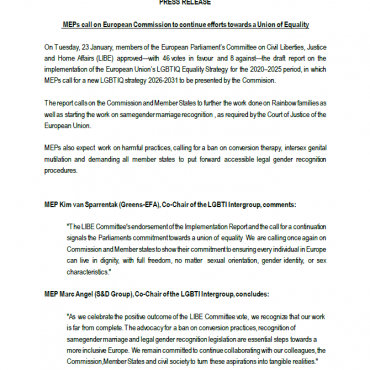Future EU human rights ambassador should promote LGBT rights, Parliament says
The European Parliament has recommended that the future EU Special Representative for Human Rights, soon to be appointed, should promote the human rights of lesbian, gay, bisexual and transgender people worldwide.
 The Foreign Affairs Council (comprising all 27 foreign affairs ministers in the EU) are expected to appoint the new Special Representative at their 25 June meeting in Brussels.
The Foreign Affairs Council (comprising all 27 foreign affairs ministers in the EU) are expected to appoint the new Special Representative at their 25 June meeting in Brussels.
The Representative will represent the European Union globally on matters of human rights. They will report directly to Catherine Ashton, High Representative of the EU for Foreign Affairs and Security Policy.
In today’s resolution, the European Parliament asks the Foreign Affairs Council to grant the Special Representative “a strong, independent and flexible mandate”, including “gender issues, and the fight against discrimination in all its forms, whether based on disability, racial or ethnic origin, gender, sexual orientation or gender identity”.
Furthermore, the Parliament recommends that the mandate be based on the principles guiding the EU’s human rights policy, including the Toolkit to Promote and Protect the Enjoyment of all Human Rights by Lesbian, Gay, Bisexual and Transgender (LGBT) People.
Ulrike Lunacek MEP, Co-President of the LGBT Intergroup, welcomed the resolution: “The human rights of lesbian, gay, bisexual and transgender people are still violated across the world, and the EU has never spoken out more strongly on these issues.”
“The Foreign Affairs Council should appoint someone who will take a strong and principled stance for indivisible human rights”, she concluded.
Michael Cashman MEP, the other Co-President of the LGBT Intergroup, added: “I trust Catherine Ashton will select someone who is highly capable, committed, and recognised for their human rights track record. The Parliament will see to it that LGBT people’s human rights are strengthened thanks to this new Special Representative.”
Read more:
Photo credit: © European Union 2012 – European Parliament






